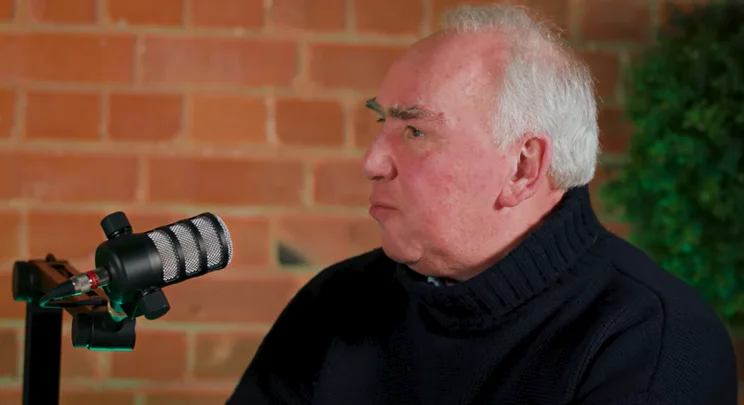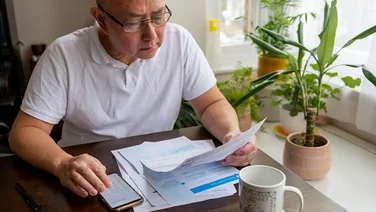We receive a small fee from trusted installers when you request a quote through our site. This helps us keep our content independent, well-researched and up to date – Learn more
- The Spark Gap is holding back installation roll out
- Ministers need to take fight to populists to achieve net zero
- Chancellor Rachel Reeves will deliver Autumn Budget on the 26 November

The government needs to show political courage if it is going to make heat pumps the financial choice for households, hit its installation targets and achieve energy independence, according to industry experts.
Speaking to The Eco Experts, Bean Beanland, director for growth and external affairs at the Heat Pump Federation, said the government needs to show “political courage” to hit its target of 600,000 installations a year by 2035.
This would mean fighting the powerful fossil fuel lobby and taking on the ideas of populism, which are threatening net-zero policies. The most important factor, according to Beanland, would be to make heat pumps ‘the economic choice’.
In other words, make having a heat pump the more economically beneficial option.
The problem, Beanland says, is that successive governments have not been brave enough to do what is necessary.

Get £7500 towards your heat pump installation through a trusted installer
An MCS-certified heat pump installer can apply for the Boiler Upgrade Scheme on your behalf, get a quote from one now
“We’ve had political cowardice ever since we started to really consider whether or not we should be decarbonising the UK,” Beanland told us, pointing out that the fossil fuel lobby and populism is holding the government back from making heat pumps economically beneficial for consumers.
A major factor holding back the roll out of heat pumps is the so-called ‘Spark Gap’, which refers to the price difference between gas and electricity.
What is the Spark Gap?
Often cited as a huge barrier in the way of the heat pump roll out, the ‘Spark Gap’ means electricity is, at the time of writing, 26.35 pence per kilowatt hour (KwH), four times more expensive than gas, which is 6.29 pence KhW.
Electricity is so much more expensive because the price is dictated by the price gas-fired powered power stations need to pay for the natural gas they then use to generate electricity for the grid.
As recently as 2023, at least one-third of the UK’s electricity was generated by the burning of natural gas, according to a report by the IEA. As power stations pay for gas at wholesale prices, they are at the mercy of price shocks, such as the Russo-Ukraine war.
It is also affected by ‘green levies’, charges that are put on the price of electricity to pay for green projects. These charges account for about 13.5% of the electricity bills you pay, with about 40% being made up by the wholesale price of gas.
Can the government do anything about the Spark Gap?
Yes, the government could do something about the Spark Gap, namely to move those charges into general taxation.
A report by climate think tank E3G earlier this year stated that the average household energy bill could be cut in half if the government removed green levies from electricity, pointing out that installing a heat pump on its own wouldn’t be enough.
The think tank made several suggestions to help the roll out of heat pumps, with sorting out the Spark Gap being number one, and E3G aren’t alone in their analysis. In April 2025, several major energy suppliers, including Octopus and Ovo, signed an open letter to the government, urging ministers to push the charges into general taxation.
When approached by The Eco Experts, Gary Felgate, chief executive, The MCS Foundation agreed that the best way forward was to fix the Spark Gap, stating that the upcoming Autumn Budget is an opportunity to do so.
“Britain’s disproportionately high electricity prices is a major barrier to increasing adoption,” Felgate explained. He also urged the government to give the heat pump certainty, including delivering a “robust plan to phase out fossil fuels and decommission the gas grid”.
Despite the challenges facing the sector, Felgate insists the rollout of heat pumps in the UK is going well, saying that according to MCS data installations are rising rapidly. In 2024, there were 60,000 heat pumps installed in the UK, a year-on-year increase of 43%.
This is in part helped by the Boiler Upgrade Scheme, the government’s flagship grant for heat pump installations. According to Ofgem applications for the Boiler Upgrade Scheme grew by 79% year-on-year in January this year. Between May and September 98,722 people applied for the Boiler Upgrade Scheme, 69,755 of which were accepted.

Get £7500 towards your heat pump installation through a trusted installer
An MCS-certified heat pump installer can apply for the Boiler Upgrade Scheme on your behalf, get a quote from one now
The success of the Boiler Upgrade Scheme shows that the heat pump market will not stall as long as it is given the right amount of support. While the Boiler Upgrade Scheme is a huge help, the biggest boost the government could give to heat pumps would be to fix the Spark Gap and make the technology the economic choice for households.
According to Beanland, not only does the government need to make electricity cheaper than gas, it needs to be open about why it is doing so.
“The government needs to do something about the Spark Gap but they also need to start saying they’re going to do something about it, because at the moment, they’re not even doing that,” Beanland said.
Making heat pumps the economic choice for households will, Beanland says, take some political courage.
Will the government fix the Spark Gap?
Probably not, or at least it’s very unlikely that the government will do anything about the Spark Gap. Why? Because doing so would mean moving the ‘green levies’ away from electricity and into general taxation or onto the price of gas.
While some, including suppliers and think tanks, believe putting the levies into general taxation would bring down energy prices in the long term, the Labour government promised not to raise taxes during the general election campaign in 2024.
When it comes to putting them onto the price of gas, this is equally difficult for the government. This is because it would severely disadvantage lower income households who rely on gas for their energy.
According to the 2021 Census there are an estimated 4.4 million households off the gas grid in the UK, compared to the more than 25 million who use it to heat their homes – that’s roughly 85% of all homes in the UK.
The fact that fixing the Spark Gap would cause problems for the government in the short term makes any real progress unlikely, especially as any policy shift that raises taxes or makes bills more expensive for lower-income households would be leapt upon by populists who don’t believe in net zero or decarbonising home heating.

Reform UK, the party currently leading all national opinion polls, have promised to rip up net-zero initiatives should they form the next government. The Conservatives, who have lost support to Reform, have also said they would scrap key eco-friendly legislation if they were to return to Number 10.
Having two opposition parties loudly, and successfully, lambasting the idea of clean energy in opposition makes it very tough for the government to make any bold move towards making heat pumps the economic alternative, despite the long term benefits of energy independence and less vulnerability to gas markets in the long run.
“The problem with populism is that there are no votes in telling the truth,” according to Beanland, who said the government missed its chance to be bold at the start of its time in office, something which it is unlikely to get back before the next election in 2029.
“There are votes in bringing down energy bills, and my criticism of this government is that they had the opportunity, with a massive majority and five years to use it, to do something pretty radical on the price of fuels, and they didn’t take it.”
The present populist threat and economic instability has put the government into what Beanland calls “vote-saving mode”, something which ordinarily wouldn’t happen until halfway through the parliamentary cycle.
“[The government] boxed itself in because it came in on the basis that it wasn’t going to increase taxes… and any commentator will tell you the only palatable way to do anything about the levies currently applied to electricity is to put them into general taxation.
“The treasury won’t do that and they won’t put it in gas bills because they’re worried about hurting those at the bottom,” Beanland said.
While the government did come in promising not to raise taxes, it also pledged to make the UK energy independent, and heat pumps will be a monumentally important tool in achieving that.
This means ministers will have to make a decision over what risks it will take, and Chancellor Rachel Reeves’ Autumn Budget in November may be a key point in how this government will pursue energy independence.

Get £7500 towards your heat pump installation through a trusted installer
An MCS-certified heat pump installer can apply for the Boiler Upgrade Scheme on your behalf, get a quote from one now









